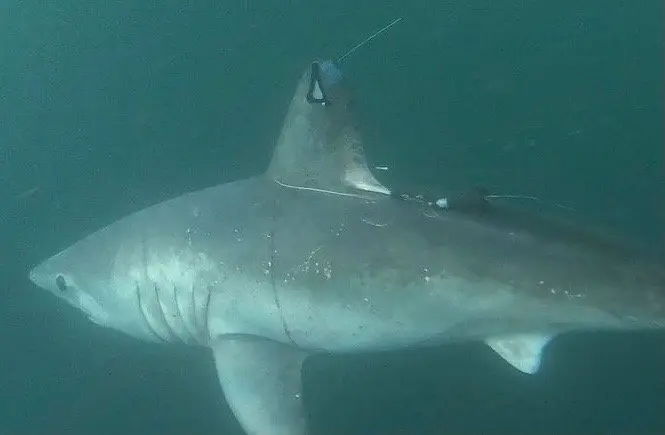What Ate This 8-Foot Pregnant Shark?! Scientists Were Stumped

Researchers were tracking an 8-foot-long pregnant porbeagle shark when, well, something ate her deep down in the ocean’s twilight zone. The scientists knew something ate her because she had a pop-off satellite archival tag (PSAT) attached to her body, and the tag indicated the pregnant shark’s environment suddenly went from cold to warm, like inside-something’s-body warm. But what in the world eats an 8-foot-long shark?
Not a marine mammal, researchers said. The tag registered a temperature that was warmer than the water at the tag’s depth, but not warm enough to indicate it was inside a warm-blooded animal, like an orca or other toothed whale. It was a cold-blooded killer, then. The scientists then considered which endothermic (cold-blooded) predators would make sense based on the geographic location, depth, and temperature data still being reported by the tag, along with the sheer size of the pregnant porbeagle.
“Two endothermic predator candidates large enough to predate upon mature porbeagles and located within the vicinity and at the time of year of the predation event include the white shark Carcharodon carcharias and shortfin mako Isurus oxyrhinchus,” the study says.
Research has shown that both candidate species will eat other sharks if conditions are right, and both species have broad depth distributions that would explain their potential presence at the crime scene—which was near Bermuda in mesopelagic waters (depths of 200-1,000 meters or 650-3,300 feet). The scientists had to dig a bit deeper to decipher this baffling conundrum.
A Suspect Identified
“Tagged shortfin makos mainly occupied depths less than 400 m and made rapid oscillatory dives between the sea surface and deeper depths during the day while in offshore waters of the North Atlantic, which was not characteristic of the predator’s behavior in this study,” the researchers wrote. “In comparison to shortfin makos, large female white sharks spent more time at depths of 400-600 m while in mesopelagic waters of the North Atlantic. Given this comparison, a white shark was likely the predator of our tagged porbeagle.”
A great white shark, then, was the likely predator of this 8-foot-long pregnant porbeagle shark as it cruised around the mesopelagic zone—also called the twilight zone. The researchers suggest this is the first evidence of predation on a porbeagle globally.
Source: https://outdoors.com/what-ate-this-8-foot-pregnant-shark-scientists-were-stumped/






